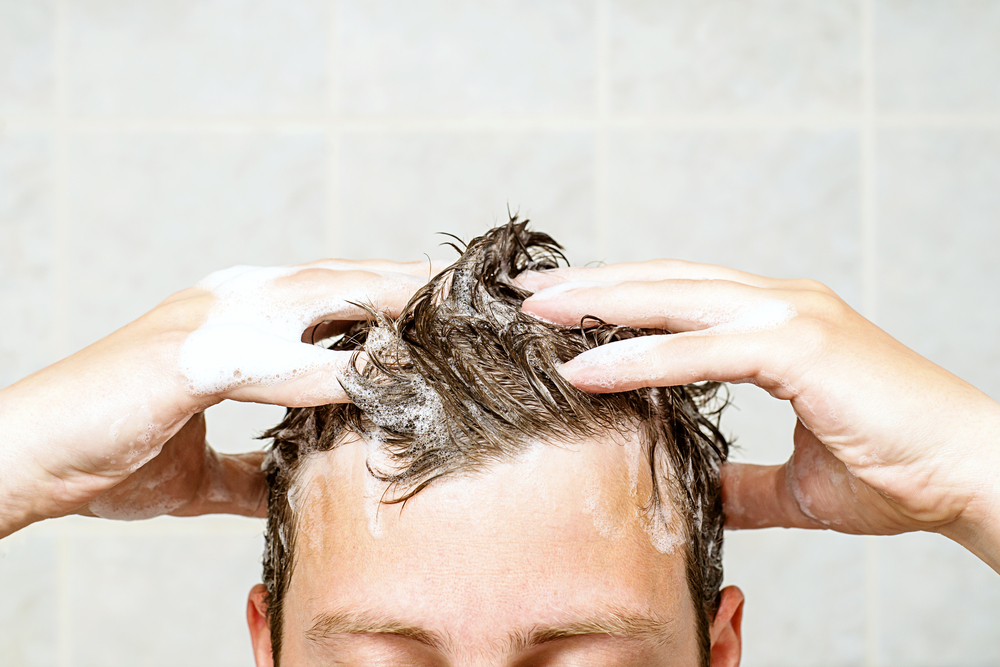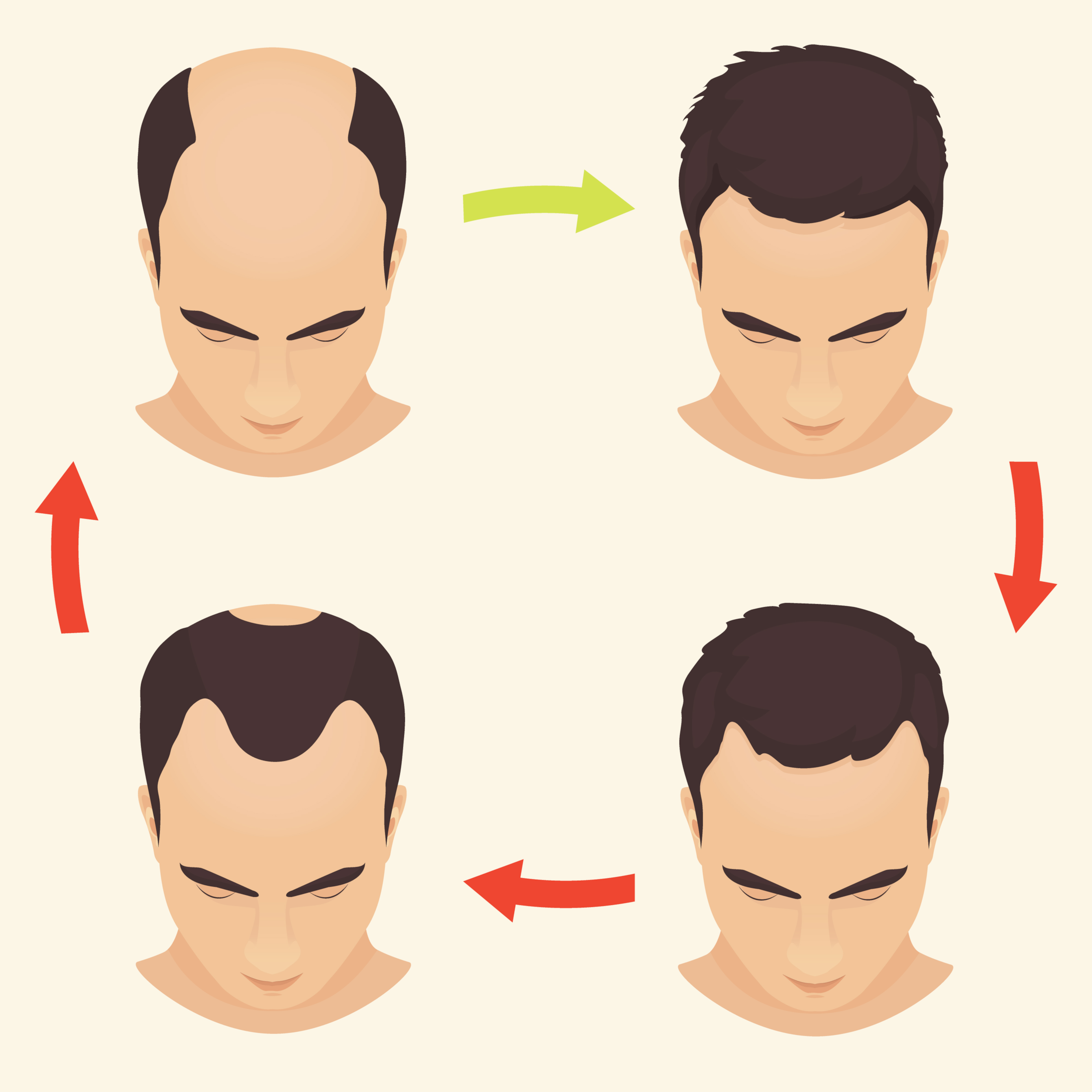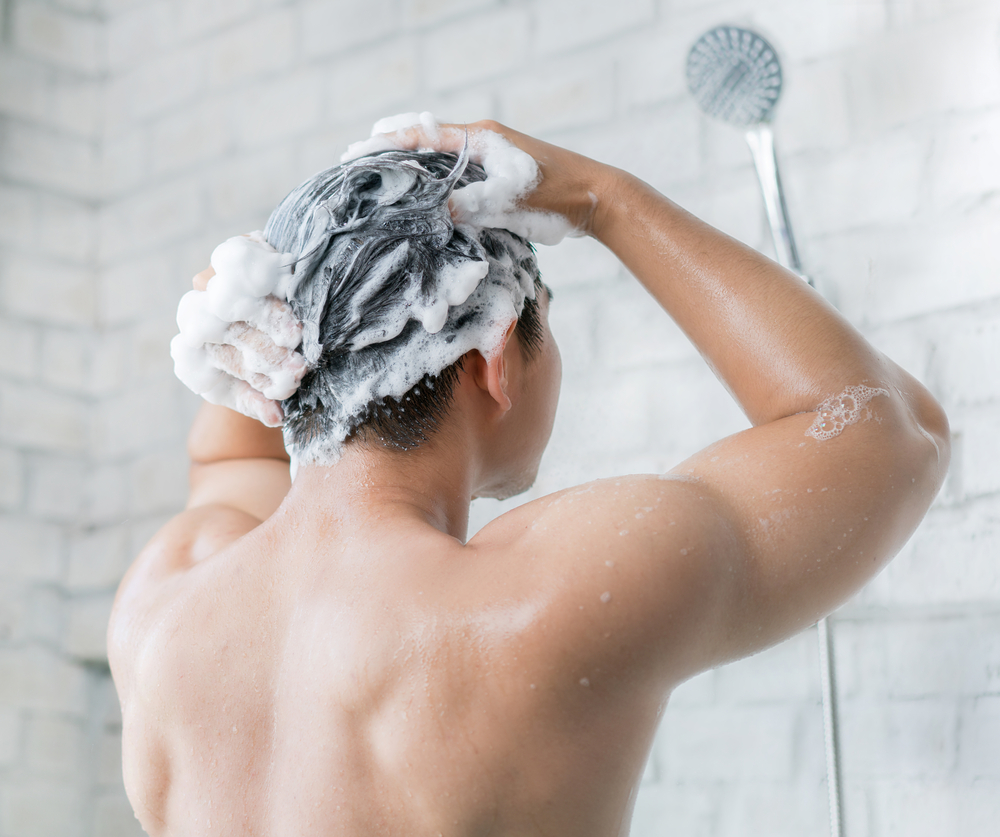DHT-blocking shampoo and hair loss
If you’re suffering from male pattern hair loss (aka androgenetic alopecia), you’re not alone; the research shows that by the age of 35, approximately two-thirds of men will have experienced some degree of hair loss, and by the age of 50, around 85% of men will have significant thinning.
Hair loss can have a significant impact on self-esteem and confidence; thankfully, this has driven efforts towards finding effective hair growth treatments. While we’re seeing an increasing number of products on the market that claim to be effective at promoting hair regrowth and treating male pattern baldness, DHT blocker shampoos have gained popularity in recent years thanks to their natural ingredients and easy application.

After all, lathering up your locks is a pretty normal activity that can slot easily into a daily routine. For some people, popping hair loss medication pills or going under the knife for a hair transplant can be offputting and may come with unwanted side effects.
Of course, not all DHT blocker shampoos are created equal, with mixed evidence for the ingredients and varying hair growth results based on individual factors like genetics and hair loss progression.
If you are considering trying a DHT blocker shampoo for hair loss, it’s important to research and choose a high-quality product with effective ingredients. The right ingredients can not only stimulate hair growth but also improve general scalp health and promote better quality, healthy hair.
In this article, we’ll explore the benefits of DHT blocker shampoos, how they work, and what to look for when choosing a product. Read on to find out more about this promising hair loss treatment option.
What is DHT?
DHT, or dihydrotestosterone, is a male sex hormone (or “androgen”) made from the natural conversion of testosterone. We normally think of testosterone as the only male hormone, but DHT is much more potent and is the main driver behind developing male characteristics like sexual development, facial hair and body hair growth, a deep voice and increased muscle mass.
So more muscle and a thick, luscious beard- DHT seem great! Unfortunately, it also has some unwanted side effects.
DHT is thought to increase sebum production in the skin, leading to acne, and also drives prostate growth, causing an enlarged prostate and an increased risk of prostate cancer.
It’s also been linked with an increased heart disease risk, although there are a lot of factors at play here.
Finally, DHT is the root cause of male pattern baldness- so ironically, it stimulates beard growth, but at the expense of a full head of hair! It’s no surprise that many hair loss treatments target this troublesome hormone, as reducing its effects can potentially slow hair loss and promote growth.
How does DHT cause hair loss?
In genetically susceptible people, DHT causes the progressive weakening and thinning of hair resulting in the characteristic pattern of baldness: a receding hairline, balding at the crown (aka the “bald spot”) and general thinning until the hair is almost completely gone.
In the body, testosterone is converted into DHT by the enzyme 5-alpha-reductase. In all men, the conversion of testosterone to DHT happens in the hair follicles, but not everyone will get hair loss.
This is because genetics play a big role in how sensitive the hair follicles are to DHT. If you’ve lost the genetic lottery, DHT will act on hair follicles to trigger hair loss in two ways:
Miniaturisation
When DHT binds to hair follicles they can slowly shrink, weaken, and ultimately stop producing hair. This process is known as follicle miniaturisation. Even if you haven’t fully lost your hair, you may notice your hair thinning or becoming coarser — and this miniaturisation process is responsible.

Disrupted hair growth cycle
Your hair follicles usually follow a characteristic growth cycle. However, DHT interferes with this cycle, shortening the growth phase and lengthening the period in which your hair doesn’t grow at all.
The overall effect is the characteristic pattern of hair loss that we associate with male pattern balding: balding at the temples, a receding hairline, thinning at the crown and then eventually complete hair loss along the top of the scalp.
The combination of DHT (a sex hormone, or androgen) and genetics explains the scientific name for male pattern balding, androgenetic alopecia.
So if you’ve already started balding (and your family pictures look a little sparse in the hair department), you’re probably genetically susceptible. The only piece of the puzzle you can control is therefore the levels of DHT- and that’s where anti-DHT treatments come in.
How do DHT-blocking shampoos work?
With DHT putting the brakes on hair follicle growth all over the scalp, it seems a natural target if you want to promote healthy hair growth.

One potential solution for combating male pattern hair loss is DHT-blocking shampoos. DHT, or dihydrotestosterone, is a hormone that is produced in the body and can contribute to hair loss by causing the hair follicles to shrink over time. By blocking DHT, anti-DHT shampoos may be able to slow or even reverse the effects of male pattern hair loss.
What are the best natural anti-DHT shampoo ingredients?
With a growing list of shampoo products claiming to block DHT, it’s worth knowing which ingredients could boost hair regrowth, so you can whittle down the list and select the best DHT–blocking shampoos.
Many hair growth shampoos take advantage of herbal ingredients, plant oils and plant extracts to produce a natural hair growth formula. We’ve outlined some of the ingredients with a stronger evidence basis.
Saw palmetto
Saw palmetto is the commercial name for the medicinal extract from Serenoa repens, a type of palm that grows in the United States. It’s thought to be a bit of a wonder drug these days — with claims around that it can increase testosterone levels, improve the health of your urinary tract, and treat an enlarged prostate.
There aren’t too many studies on the use of saw palmetto in hair loss, but one study found that it decreased DHT levels by 32%. Other studies have shown that around 40% of men using saw palmetto as a treatment for hair loss found that it increased the growth of new hair.
So while we still need more evidence on this, it’s one of the anti-DHT ingredients that is backed by some evidence, so is worth considering as an option.
Caffeine
Caffeine has also been credited with certain powers in the battle against balding- but don’t go dunking your head into your morning cappuccino! For caffeine to have any effect on your hair, it should be applied topically — such as with a hair growth shampoo.
What do the studies say? There seems to be pretty good evidence for caffeine and hair growth when it is applied to hair follicles, even producing comparable results to medications.
However, the study results do vary so for now we probably need more evidence to make any definitive conclusions on exactly who can benefit. But as a natural option to promote hair growth? Caffeine seems to be a solid option.
Biotin
Biotin, or vitamin B7, helps to maintain the health of our hair, nails, and skin. It does so by converting nutrients from our food into energy. Studies show that Biotin is a useful supplement for supporting hair regrowth, although this is through its role in supporting the production of keratin (the building blocks of hair) rather than a DHT-blocking effect.
Other vitamins and minerals, such as Zinc and Magnesium, contribute to healthy hair in a similar way. Take a look at our hair vitamins article here for more information.
Pumpkin seed oil
Pumpkin seeds are another substance believed to be a natural DHT blocker. Originally found to be a 5-alpha reductase inhibitor in rats, studies have now explored the potential of pumpkin seed oil to reduce DHT in humans too.
The good news? Participants in the study who were treated with pumpkin seed oil had 40% more hair and no side effects. The less good news? It was a very small study, which isn’t hugely reliable. There may well be something here, but more research is needed.
Which DHT-blocking ingredients are less effective?
If you scour the internet for DHT-blocking shampoo, you’ll find a wide range of other natural extracts, oils and products that are tagged with the “anti-DHT” label. Unfortunately, the majority of these are not backed by strong enough evidence to justify their inclusion in a DHT- blocking shampoo. Let’s take a look at some of the most common culprits.
Green tea extract
Another natural substance with a reputation as a miracle cure, green tea extract has been found to have possible 5-alpha reductase-inhibiting powers. That’s down to a chemical known as epigallocatechin gallate (ECGC), which has been found to reduce the impact of DHT on your hair follicles.
However, scientific studies have not yet been conclusive. One study even found that green tea increased the amount of DHT.
Pygeum
This extract from the bark of the African plum tree has been used to treat a variety of health conditions for decades, including the symptoms of an enlarged prostate. However, the evidence is inconclusive and it’s not confirmed whether the bark extract acts to block DHT, or if it works in another way.
Rosemary oil
While touted as a miracle for hair growth (among many other health conditions!), rosemary oil is not strongly evidence-based when it comes to promoting hair growth. There has been one study that showed comparable results with Minoxidil but, with a tiny sample size, doesn’t justify its inclusion in a hair loss shampoo.
Argan oil
While it may work as a nourishing and hydrating product for both hair and skin, there is no evidence that argan oil – the oil from the fruit of the argan tree – works as a treatment for hair loss or thinning hair.
Aloe vera
Famous worldwide for its health benefits, aloe vera can help to give you a healthy scalp, reduce dandruff, and support damaged hair to return to health. However, it won’t tackle DHT, the thing that is causing your hair loss in the first place.
Coconut oil
Coconut oil is another of the natural ingredients touted for its possible treatment of hair loss. While many swear by it, there have been no scientific studies to support its effectiveness.
What other DHT blockers are there?
DHT-blocking shampoo is not the only way to get the same effect on DHT and hair loss. there are plenty of treatments that claim to reduce DHT levels and therefore combat hair loss. Let’s take a look at the main candidates:
Finasteride
Finasteride (often sold as Proscar or Propecia) is currently the only evidence-backed DHT blocker on the market. It works by blocking the enzyme 5-alpha reductase which prevents DHT production from testosterone- and it’s very effective. In fact, studies have shown that with Finasteride, DHT levels in the scalp are reduced by 60%, giving your hair follicles time to recover.
This has made Finasteride one of the most effective hair loss treatments currently available and it has been consistently shown to be effective in about 9/10 of men who use it.
For androgenic alopecia, Finasteride can not only slow further hair loss but actually encourage hair growth and undo the DHT hair loss damage. It won’t be exactly the same for everyone but, if there’s one medication to try for male pattern hair loss, it’s this one.
Dutasteride
While it’s the only one licensed for the treatment of male pattern baldness, Finasteride is not the only 5-alpha reductase inhibitor out there. Dutasteride, a common treatment for an enlarged prostate, has a similar function. It just hasn’t been comprehensively studied on male hair loss.
The research that has been done on Dutasteride suggests that it could be just as effective as Finasteride. However, more information is needed before it can be prescribed to tackle DHT-induced hair loss.
Ketoconazole
Ketoconazole is actually an antifungal medication, commonly used to treat dandruff and other scalp conditions. However, some studies have suggested that it may also be effective in treating hair loss, potentially through a DHT-blocking effect.
While ketoconazole shampoo may sound like an easy solution, it’s important to note that the evidence supporting its effectiveness is limited. Most of the studies conducted on ketoconazole and hair loss have been small and have not been conducted over a long period, so for now it’s worth keeping as a backup option.
Also, please make sure to speak to your doctor before you try it because it can interfere with other medications and does come with side effects.
So what is the verdict on DHT blocking shampoos?
As a slightly gentler form of hair loss medication, DHT-blocking shampoos offer the convenience and ease of use that other methods used to treat hair loss. But while DHT-blocking shampoos can have fewer side effects, it’s important to be careful with which ones you choose to buy.
Thanks to a huge- and ever-growing- list of potential ingredients, you may find yourself investing in DHT-blocking shampoo that is more dud than sud, and potentially even causing harm. And even with the best ingredients, you might be shortchanging potential hair growth results compared to the gold-standard treatments of Finasteride and Minoxidil.
If you’re considering using a DHT-blocking shampoo, get in touch with a Manual clinician so we can assess your options and steer you onto the right track.
Manual Power Shampoo
If you’d like to explore a natural DHT-blocking shampoo, take a look at our Power Shampoo, produced from the ingredients that science says work best for tackling thinning hair: biotin, saw palmetto, and caffeine.
We’ve loaded it with high-quality premium ingredients like Wheat Protein, Vit B3, Magnesium and Zinc to boost the health of your hair follicles and support hair growth. And we’ve topped it up with some essential oils too – using extracts of sage and ginger – to make it as lovely a shampooing experience as you could hope for.
The result? A gentle, effective hair growth shampoo with no harsh chemicals, suitable for regular use. Plus it’s a cruelty-free, paraben-free, sulfate-free shampoo
And that’s why we’re proud to say it’s one of the best hair care products out there. Take a look here.
Key takeaways
- The hormone dihydrotestosterone (DHT) is the key driver of hair loss in androgenic alopecia, aka male pattern hair loss
- Anti-DHT shampoos are hair loss treatments designed to block DHT, using natural ingredients
- While some anti-DHT shampoo ingredients (caffeine, saw palmetto and pumpkin seed oil) are better supported with scientific evidence, anti-DHT shampoos are not as effective as the current gold-standard treatments, Minoxidil and Finasteride
- If you’d like to explore hair loss shampoos, take a look at our Power Shampoo, made with high-quality ingredients backed by evidence
While we’ve ensured that everything you read on the Health Centre is medically reviewed and approved, information presented here is not intended to be a substitute for professional medical advice, diagnosis, or treatment. It should never be relied upon for specific medical advice. If you have any questions or concerns, please talk to your doctor.
While we've ensured that everything you read on the Health Centre is medically reviewed and approved, information presented here is not intended to be a substitute for professional medical advice, diagnosis, or treatment. It should never be relied upon for specific medical advice. If you have any questions or concerns, please talk to your doctor.




